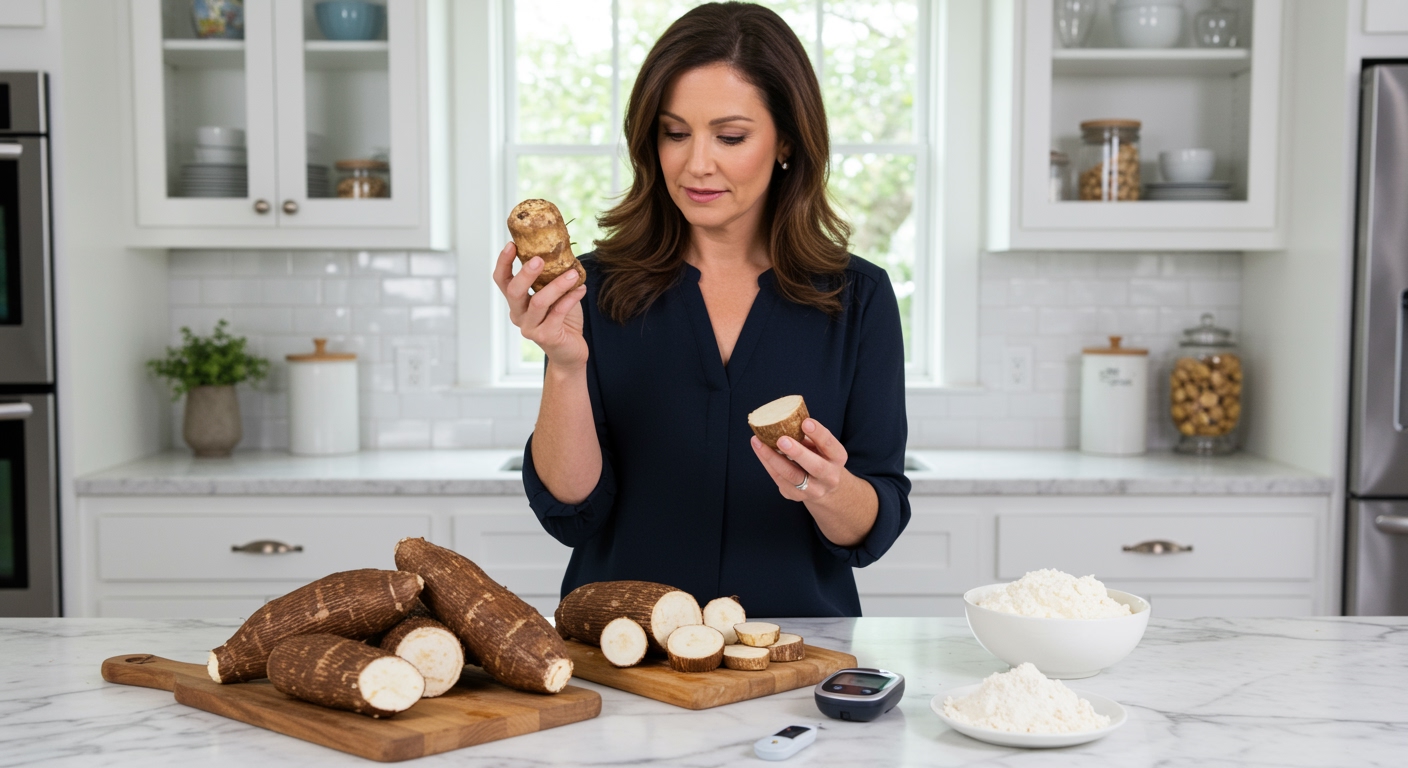✪ Key Takeaway: Yucca can be good for diabetes when eaten in controlled portions due to its fiber content and lower glycemic index than potatoes.
Introduction
Your doctor just told you to watch your carbs, and now you are staring at that yucca root in the grocery store wondering if it will spike your blood sugar.
You might be asking this question because yucca looks like a potato, tastes starchy, and you have heard conflicting information about whether root vegetables are safe for diabetics.
Hi, I am Abdur, your nutrition coach and today I am going to explain exactly how yucca affects blood sugar levels and whether it deserves a place in your diabetes meal plan.
What Makes Yucca Different From Other Starchy Foods?
Yucca root contains about 38 grams of carbohydrates per 100 grams, which puts it in the moderate carb category for root vegetables.
The key difference lies in yucca’s fiber content and how your body processes its starches.
Unlike white potatoes that cause rapid blood sugar spikes, yucca contains resistant starch that your small intestine cannot fully digest.
This resistant starch acts like fiber in your digestive system, slowing down glucose absorption and preventing those dangerous blood sugar rollercoasters.
Research shows that yucca has a glycemic index of around 51, which classifies it as a low to moderate glycemic food.
For comparison, white potatoes score between 70-85 on the glycemic index, making yucca a much better choice for blood sugar control.
✪ Fact: Yucca contains more potassium than bananas, providing 558mg per 100 grams.
How Does Yucca Affect Your Blood Sugar Response?
When you eat yucca, your body breaks down its complex carbohydrates more slowly than simple starches found in processed foods.
The fiber in yucca forms a gel-like substance in your stomach that delays gastric emptying, which means food moves more slowly from your stomach to your small intestine.
This slower digestion process leads to a more gradual release of glucose into your bloodstream rather than the sharp spikes you get from eating white bread or sugary snacks.
Studies indicate that foods with resistant starch can improve insulin sensitivity over time, helping your cells respond better to insulin signals.
The resistant starch in yucca also feeds beneficial bacteria in your gut, producing short-chain fatty acids that may help regulate blood sugar levels.
However, portion size still matters because even slow-digesting carbs will raise blood sugar if you eat too much at once.
✪ Pro Tip: Test your blood sugar 2 hours after eating yucca to see your personal response.
What Are The Hidden Benefits Of Yucca For Diabetics?
Beyond blood sugar control, yucca provides several nutrients that specifically benefit people with diabetes.
The high potassium content in yucca helps counteract sodium and supports healthy blood pressure, which is crucial since diabetes increases cardiovascular disease risk.
Yucca contains antioxidants like vitamin C and beta-carotene that help combat oxidative stress, a major contributor to diabetic complications.
The resistant starch acts as a prebiotic, feeding good bacteria in your gut and potentially improving your body’s ability to regulate blood sugar naturally.
Some research suggests that regular consumption of resistant starch may help reduce inflammation markers associated with insulin resistance.
Yucca also provides steady energy without the crashes that come from eating refined carbohydrates, helping you maintain stable energy levels throughout the day.
✪ Note: Always peel yucca completely as the skin contains compounds that can be toxic.
How Should You Prepare And Eat Yucca Safely?
The way you prepare yucca significantly impacts its effect on your blood sugar levels.
Boiling yucca is the best cooking method because it preserves more resistant starch compared to frying or roasting at high temperatures.
Never eat raw yucca as it contains naturally occurring compounds called cyanogenic glycosides that can be harmful if not properly cooked.
A safe serving size for diabetics is about 1/2 cup of cooked yucca, which contains approximately 15-20 grams of carbohydrates.
Pair yucca with protein and healthy fats like grilled chicken and avocado to further slow down glucose absorption.
Cooling cooked yucca in the refrigerator overnight actually increases its resistant starch content, making it even better for blood sugar control when reheated.
Always count yucca as part of your total carbohydrate intake for the meal and adjust your other carb sources accordingly.
✪ Pro Tip: Add lemon juice or vinegar to cooked yucca to further lower its glycemic impact.
The Bottom Line
Yucca can be a valuable addition to a diabetic meal plan when eaten in appropriate portions and prepared correctly.
Smart food choices are not about elimination but about understanding how different foods affect your unique body, and yucca offers a more blood sugar-friendly alternative to many other starchy foods.
I would love to hear about your experience with yucca or any questions you might have about incorporating it into your diabetes management plan, so please share your thoughts in the comments below.
References
At NutritionCrown, we use quality and credible sources to ensure our content is accurate and trustworthy. Below are the sources referenced in creating this article:
- Healthline: Health Potential of Yucca
- PubMed: Resistant Starch and Diabetes
- PMC: Glycemic Index of Root Vegetables





